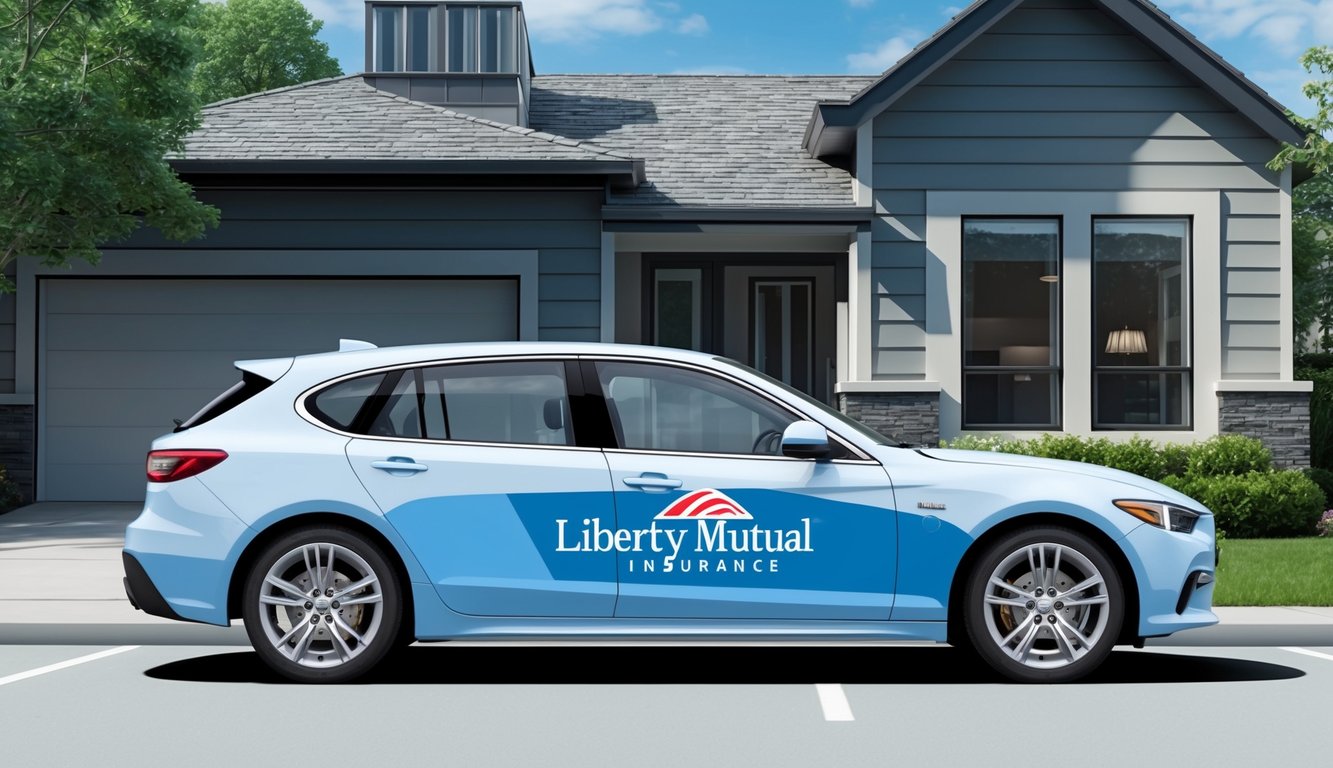Protecting your most valuable assets is essential for financial security and peace of mind.
Home and auto insurance play crucial roles in safeguarding your property and vehicles from unexpected events and accidents.
By choosing the right coverage, you can ensure that you’re prepared for life’s uncertainties.
Bundling home and auto insurance policies can offer significant advantages.
You can often save money and simplify your insurance management by combining these coverages with a single provider.
Many insurance companies offer discounts and perks for customers who bundle their policies, making it an attractive option for homeowners who also own vehicles.
1) State Farm Car Insurance
State Farm is a major player in the auto insurance industry.
You can expect comprehensive coverage options when choosing State Farm for your car insurance needs.
State Farm offers standard coverages like liability, collision, and comprehensive.
They also provide additional options such as roadside assistance and rental car reimbursement.
One standout feature is State Farm’s Drive Safe & Save program.
This usage-based insurance option can help you save money based on your driving habits.
State Farm’s customer service is generally well-regarded.
You can access their services through local agents, online, or via their mobile app.
When it comes to pricing, State Farm’s rates are competitive.
Their average annual cost for full coverage is $2,119, which is higher than the national average of $1,766.
State Farm performs well in customer satisfaction surveys.
They rank highly in J.D. Power studies, particularly in claims satisfaction.
You might find State Farm particularly appealing if you’re looking to bundle insurance policies.
They offer potential savings of up to $1,273 per year when you combine home and auto insurance.
State Farm’s financial strength is noteworthy.
This can give you confidence in their ability to pay out claims when needed.
2) Allstate Home Insurance
Allstate offers comprehensive home insurance coverage to protect your property and belongings.
You can customize your policy to fit your specific needs and budget.
Allstate provides standard coverage options like dwelling protection, personal property coverage, and liability insurance.
You can also add extra features such as water backup protection or identity theft restoration.
The company offers discounts for bundling home and auto insurance, which can save you up to 25% on your premiums.
Other discounts are available for new homebuyers, claim-free customers, and those with protective devices installed.
Allstate’s mobile app allows you to manage your policy, pay bills, and file claims easily.
You can also access their digital tools to create a home inventory and estimate your coverage needs.
Allstate ranks third in U.S. News & World Report’s Best Homeowners Insurance Companies rating.
They offer competitive rates, with an average monthly premium of $184.15 for $300,000 in dwelling coverage.
NerdWallet gives Allstate homeowners insurance a 4.5 out of 5-star rating for overall performance.
Their range of coverage options and user-friendly mobile app contribute to this positive assessment.
When considering Allstate for your home insurance needs, compare quotes with other providers to ensure you’re getting the best value for your coverage.
3) Geico Car Insurance
Geico offers competitive auto insurance rates and is known for its user-friendly online tools.
You can easily get a free car insurance quote through their website or mobile app.
Geico provides various coverage options to suit your needs.
These include liability, collision, comprehensive, and personal injury protection.
You can customize your policy based on your specific requirements and budget.
The company is recognized for its strong financial stability and excellent customer service.
You can feel confident knowing that Geico has been trusted since 1936 and is backed by Berkshire Hathaway.
Geico offers several discounts to help you save on your premiums.
These may include safe driver, multi-vehicle, and good student discounts.
You might also qualify for additional savings if you bundle your auto and renters insurance policies.
The Geico mobile app allows you to manage your policy, file claims, and access digital ID cards conveniently.
This user-friendly interface has earned Geico high rankings in mobile functionality.
When considering Geico, it’s wise to compare their quotes with other insurers.
Look at factors such as coverage options, customer reviews, and the company’s reputation alongside the price to make an informed decision.
4) Progressive Home Insurance
Progressive offers homeowners insurance with customizable coverage options.
You can get a free home insurance quote online or by calling their dedicated number.
When you bundle your home and auto insurance with Progressive, you can earn a multi-policy discount.
This can lead to significant savings on your overall insurance costs.
Progressive’s home insurance policies typically cover your dwelling, personal property, and liability.
You can add additional coverages to tailor your policy to your specific needs.
The company is known for its competitive rates.
According to some analyses, Progressive offers some of the cheapest average home insurance rates compared to competitors.
You can manage your policy easily through Progressive’s online platform or mobile app.
This allows you to view your coverage, make payments, and file claims conveniently.
Progressive partners with other insurance providers to offer homeowners insurance.
This means your actual policy might be underwritten by a different company, though Progressive handles the customer service.
Customer reviews for Progressive home insurance are generally positive.
Many customers appreciate the ease of working with the company and the potential for savings when bundling policies.
5) Liberty Mutual Car Insurance

Liberty Mutual offers car insurance in all 50 states and Washington, D.C. You can customize your policy to fit your specific needs and budget.
When you get a quote online, you could save up to 12% on your car insurance.
Liberty Mutual provides various discounts to help you reduce your premium costs.
You can manage your policy conveniently through their online platform.
This allows you to view and download important documents, pay bills, and file claims 24/7.
Liberty Mutual received above-average ratings for overall value and online experience in a recent survey.
This suggests that customers find their services satisfactory.
If you’re looking to save more, consider bundling your home and auto insurance with Liberty Mutual.
This can lead to additional discounts and the convenience of managing multiple policies in one place.
Liberty Mutual has expanded its offerings by acquiring other insurance companies like Safeco and Safe Auto Group.
This growth may provide you with more options and potentially better coverage.
6) Nationwide Home Insurance

Nationwide offers comprehensive homeowners insurance coverage to protect your property and belongings.
Their policies typically include protection for your dwelling, personal property, and liability.
You can customize your coverage with additional options like water backup protection or identity theft coverage.
Nationwide also provides a multi-policy discount when you bundle your home and auto insurance.
The average cost of Nationwide home insurance is $2,270 per year, which is higher than the national average.
However, actual rates can vary based on factors like your location and home’s characteristics.
Nationwide offers an easy quote process.
You can start your quote online or call their dedicated number to speak with an agent.
They can help you understand your coverage options and applicable discounts.
While Nationwide’s premiums may be higher than some competitors, they offer solid coverage and the convenience of bundling multiple policies.
Consider getting quotes from multiple insurers to compare prices and coverage before making your decision.
7) USAA Car Insurance

USAA car insurance offers exceptional value for military members and their families.
You can expect competitive rates and comprehensive coverage tailored to your needs.
USAA members saved an average of $725 on their annual premium when switching to USAA auto insurance.
This significant saving makes it an attractive option for budget-conscious drivers.
USAA provides flexible payment plans at no additional cost.
You can manage your policy online or through a mobile device, making it convenient to stay on top of your coverage.
The company offers various discounts, including those for safe drivers, multiple vehicles, and family members.
These can help you further reduce your insurance costs.
USAA car insurance costs an average of $1,432 per year for full coverage.
This rate is over $500 less than the national annual average, highlighting USAA’s competitive pricing.
You can enhance your policy with additional features like roadside assistance.
This service, provided through Cross Country Motor Club, offers peace of mind during unexpected breakdowns.
USAA consistently ranks high in customer satisfaction.
Their commitment to service excellence ensures that you receive prompt and reliable assistance when you need it most.
While USAA offers excellent benefits, remember that eligibility is limited to military members, veterans, and their families.
If you qualify, USAA’s car insurance is worth considering for its combination of affordability and quality coverage.
8) Chubb Home Insurance

Chubb offers high-end homeowners insurance with comprehensive coverage options.
Their policies come standard with premium features that many other insurers charge extra for.
You’ll find extensive protection for your home and belongings with Chubb.
Chubb provides full replacement cost coverage, ensuring you can rebuild your home to its original quality even if costs exceed your policy limit.
Chubb’s policies include additional coverages at no extra cost.
These range from tree removal after storms to restoration of electronic data destroyed by computer viruses.
You can benefit from Chubb’s HomeScan service, which helps detect potential issues like leaks or missing insulation in your home.
This proactive approach can prevent costly damages down the line.
Chubb offers a multi-policy discount of up to 10% when you combine your homeowners insurance with other policies like auto or life insurance.
You may also qualify for discounts if your home is new or recently renovated.
While Chubb’s premiums tend to be higher than average, their customers report very few complaints.
This suggests a high level of satisfaction with the company’s service and claims handling.
9) Farmers Car Insurance

Farmers Insurance offers a range of car insurance options to fit your needs.
You can customize your policy with various coverage types, including liability, collision, and comprehensive.
Farmers provides several discounts to help you save on premiums.
These include safe driver discounts, multi-policy bundling, and good student discounts for young drivers.
The company’s Signal app allows you to track your driving habits and potentially earn additional savings.
This telematics program rewards safe driving behaviors.
Farmers offers unique features like accident forgiveness and new car replacement coverage.
These options can provide extra peace of mind for policyholders.
You can easily manage your policy and file claims through Farmers’ online portal or mobile app.
The company also provides 24/7 customer support for your convenience.
While Farmers offers comprehensive coverage, it’s worth noting that their average premiums tend to be higher than some competitors.
However, the exact cost will depend on your individual circumstances and chosen coverages.
Farmers’ car insurance is available in most states across the U.S. You can get a quote online or through a local agent to see how their offerings align with your needs and budget.
10) Amica Mutual Home Insurance

Amica Mutual offers comprehensive home insurance coverage with exceptional customer service.
You can expect high customer satisfaction ratings from this insurer, particularly in claims handling.
When you choose Amica for your home insurance, you gain access to standard protections like dwelling coverage, personal property coverage, and liability protection.
The company also provides additional options to customize your policy.
One unique feature of Amica is its dividend policies.
These allow you to receive a portion of your premium back as a dividend, potentially reducing your overall insurance costs.
You’ll find that Amica offers various discounts to help you save on premiums.
These may include multi-policy discounts when you bundle home and auto insurance with them.
Amica’s commitment to customer service is evident in its low complaint levels.
You can expect responsive and helpful support when you need to file a claim or have questions about your policy.
The company’s long history in the insurance industry, dating back to 1907, speaks to its stability and reliability.
You can trust that Amica has the experience to handle your home insurance needs effectively.
When considering Amica for your home insurance, keep in mind that their policies may be more expensive than some competitors.
However, the superior customer service and potential for dividends may justify the higher cost for many homeowners.
Understanding Home and Car Insurance
Home and car insurance provide crucial financial protection for your most valuable assets.
These policies offer coverage against various risks and damages, giving you peace of mind and financial security.
What is Home Insurance?
Home insurance safeguards your residence and personal belongings from unexpected events.
It typically covers damage from fire, storms, and theft.
Your policy may also include liability protection if someone is injured on your property.
Most lenders require home insurance when you have a mortgage.
The coverage amount usually equals your home’s replacement cost.
Standard policies often exclude floods and earthquakes.
You may need separate coverage for these perils.
Home insurance can also cover additional living expenses if your house becomes uninhabitable due to a covered event.
This helps pay for temporary housing and meals.
What is Car Insurance?
Car insurance protects you financially in case of accidents, theft, or damage to your vehicle. Most states require a minimum level of coverage, typically including liability insurance.
Liability coverage pays for injuries or property damage you cause to others while driving.
It doesn’t cover your own vehicle or injuries.
Comprehensive coverage protects against non-collision incidents like theft or weather damage.
Collision coverage pays for repairs to your car after an accident.
You can add optional coverages like roadside assistance or rental car reimbursement.
These enhance your protection but increase your premium.
Consider your driving habits, vehicle value, and financial situation when choosing coverage levels.
Higher deductibles can lower your premium but mean more out-of-pocket costs if you file a claim.
Key Differences Between Home and Car Insurance
Home and car insurance policies differ significantly in their coverage types and how premiums are calculated.
Understanding these distinctions can help you make informed decisions about your insurance needs.
Coverage Types
Home insurance typically protects your dwelling, personal property, and liability.
It covers damage from perils like fire, theft, and natural disasters.
Personal property coverage extends to items inside your home, while liability protection covers injuries on your property.
Car insurance focuses on protecting your vehicle and liability on the road.
It includes:
- Collision coverage for accidents
- Comprehensive coverage for non-collision events
- Liability protection for bodily injury and property damage
- Personal injury protection for medical expenses
Premium Calculations
Home insurance premiums are based on factors like:
- Home value and construction materials
- Location and proximity to fire stations
- Claims history and credit score
- Safety features like security systems
Car insurance rates consider:
- Your driving record and claims history
- Vehicle make, model, and age
- Annual mileage and usage patterns
- Your age, gender, and location
Bundling discounts can range from 6% to 23%, depending on the insurer.
These savings can significantly reduce your overall insurance costs when you combine home and auto policies.
Factors to Consider When Choosing Insurance
Selecting the right insurance involves evaluating coverage, comparing costs, and understanding policy terms.
These key aspects will help you make an informed decision that aligns with your needs and budget.
Evaluating Coverage Options
When assessing insurance options, focus on the types and amounts of coverage offered.
For auto insurance, consider liability, collision, and comprehensive coverage.
Homeowners insurance should include protection for your dwelling, personal property, and liability.
Look for additional features that may be valuable to you, such as roadside assistance for auto policies or coverage for high-value items in home insurance.
Pay attention to coverage limits and deductibles, as these can significantly impact your out-of-pocket expenses in case of a claim.
Don’t forget to review optional coverages that might be relevant to your situation, such as flood insurance for homeowners or rental car coverage for auto policies.
Comparing Costs
Insurance premiums can vary widely between providers.
To get the best value, compare quotes from multiple insurers.
Remember that the cheapest option isn’t always the best – consider the coverage you’re getting for the price.
Look for discounts that can lower your premiums.
Common discounts include:
- Multi-policy bundling
- Safe driver discounts
- Home security system discounts
- Good student discounts
Be aware that factors like your driving record, credit score, and claims history can affect your rates.
Improving these factors may help you secure better premiums in the future.
Reading Policy Terms
Carefully review the terms and conditions of any policy you’re considering.
Pay close attention to exclusions, which are situations or items not covered by the policy.
For home insurance, common exclusions might include damage from floods or earthquakes.
Understand the claims process and any time limits for filing claims.
Check if the policy includes replacement cost or actual cash value coverage for your belongings.
This can significantly impact your payout in case of a loss.
Look for any special requirements you must meet to maintain coverage, such as regular home maintenance or installing specific safety devices in your car.
By thoroughly understanding your policy terms, you can avoid surprises when you need to file a claim.






